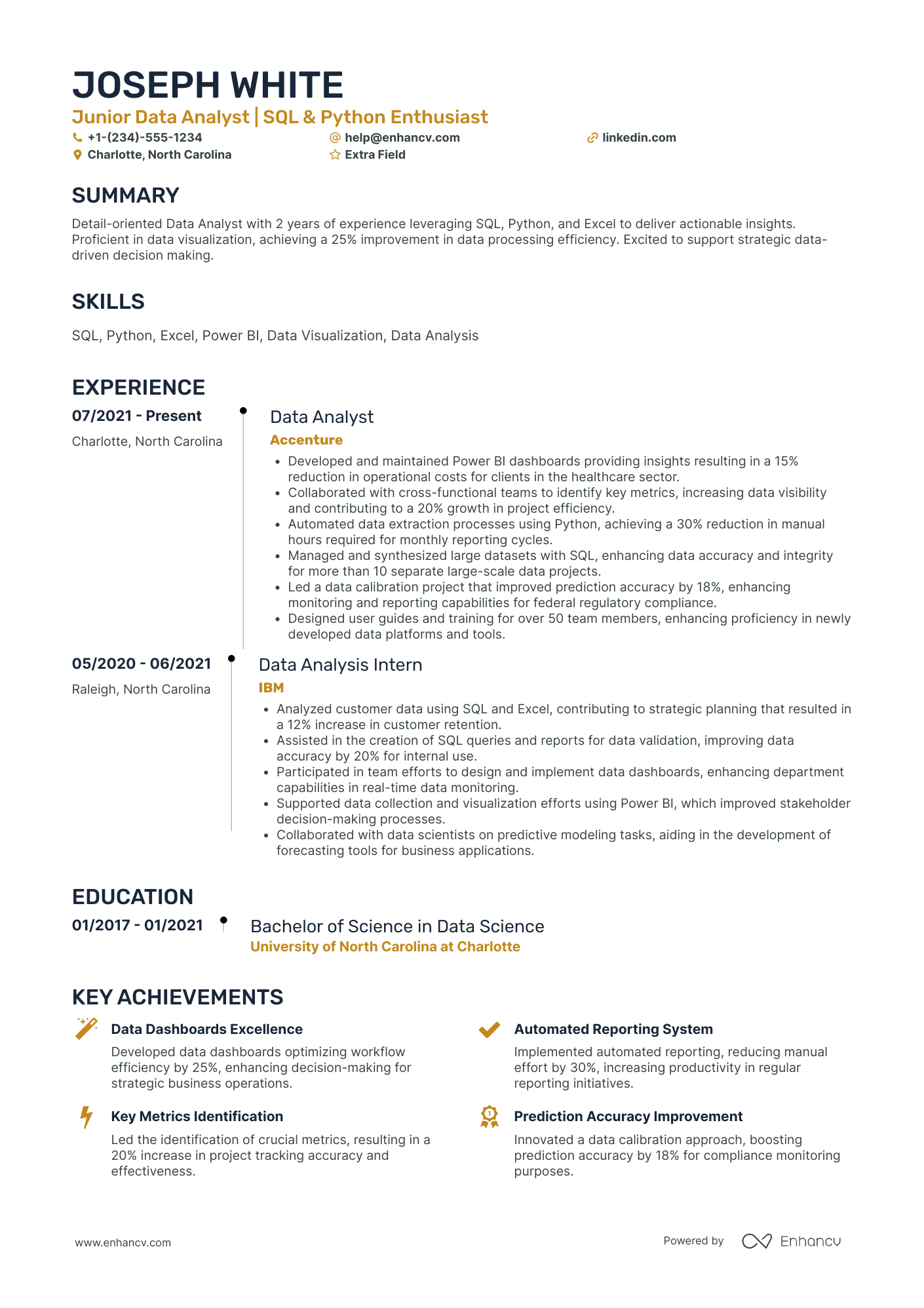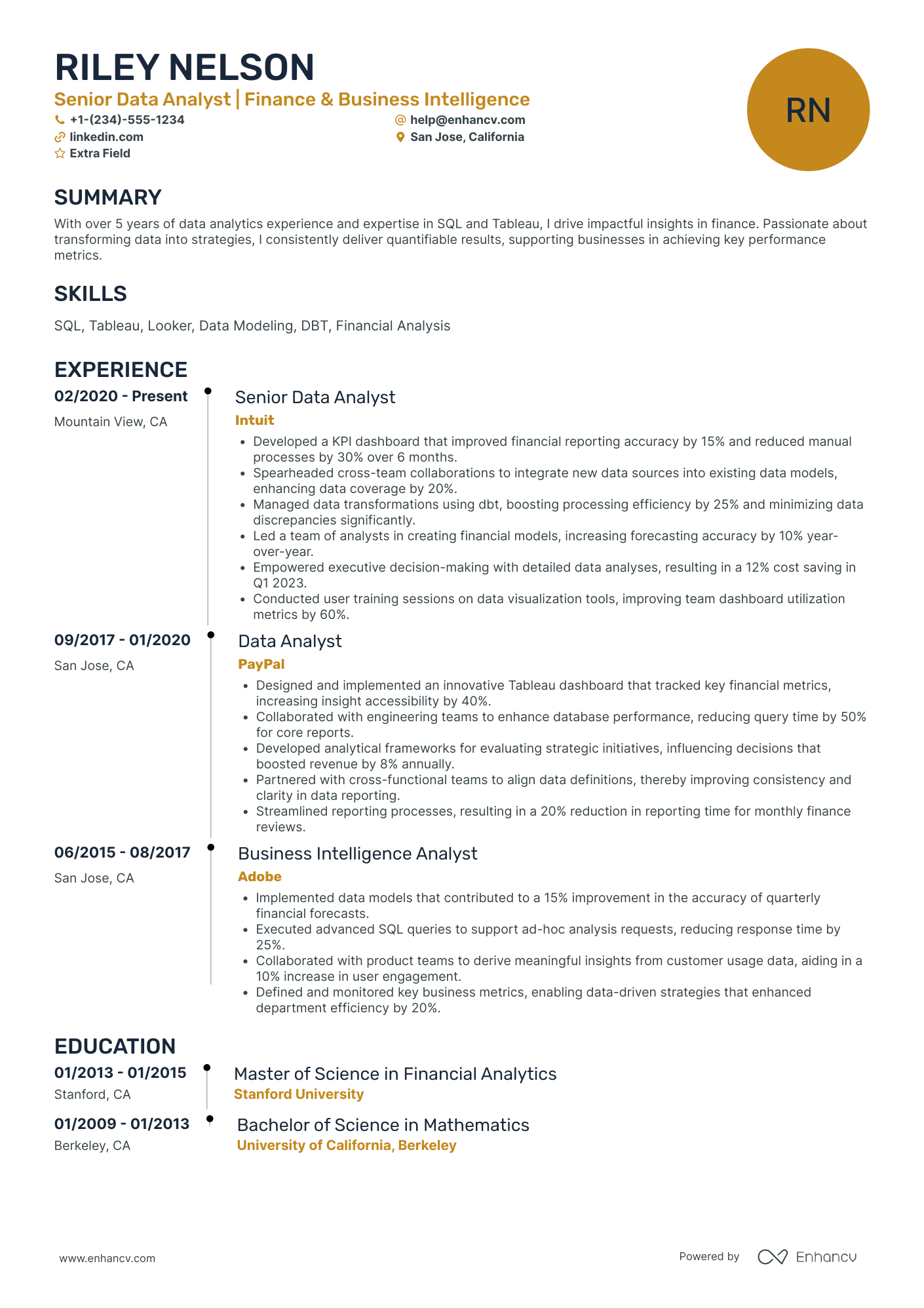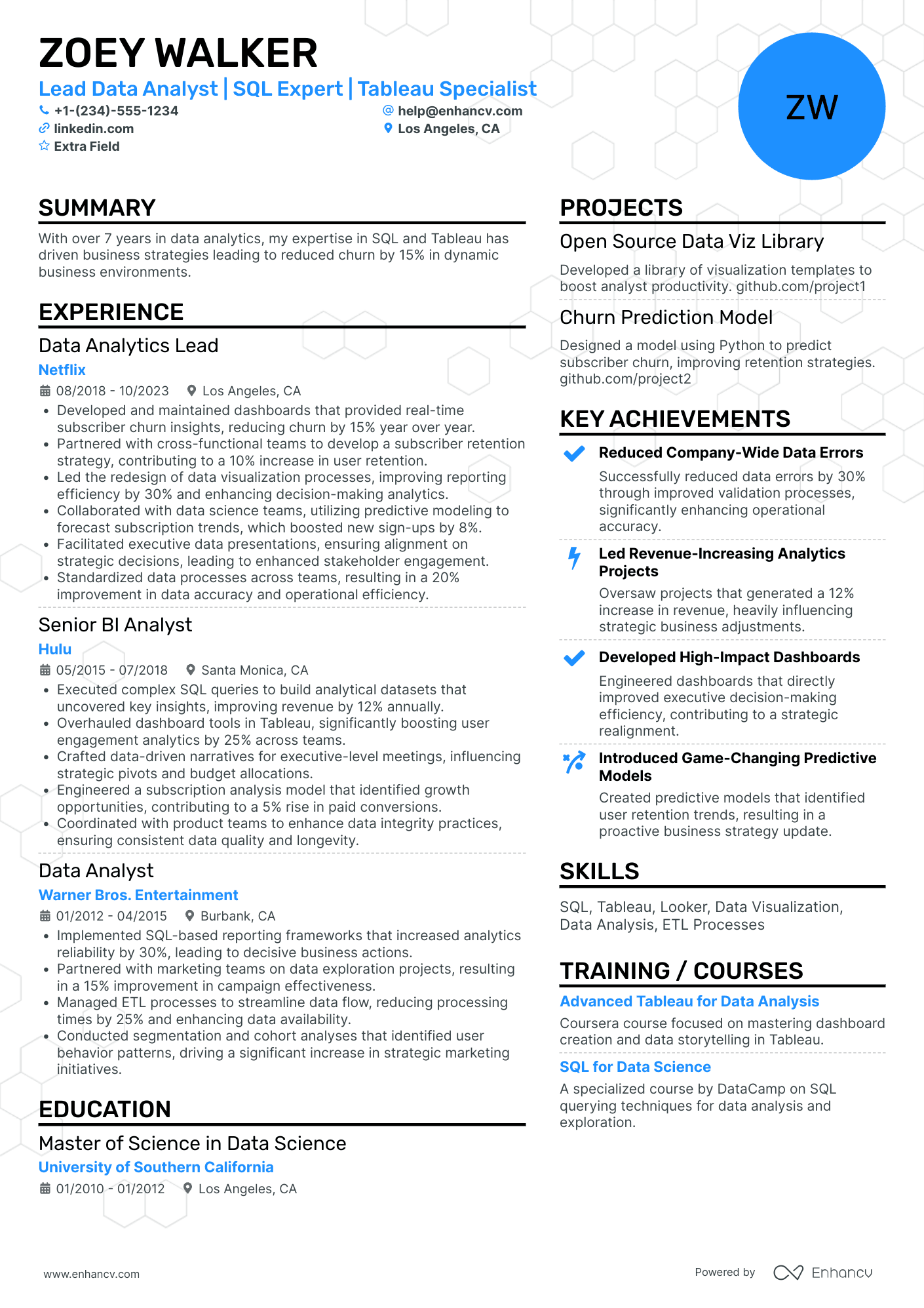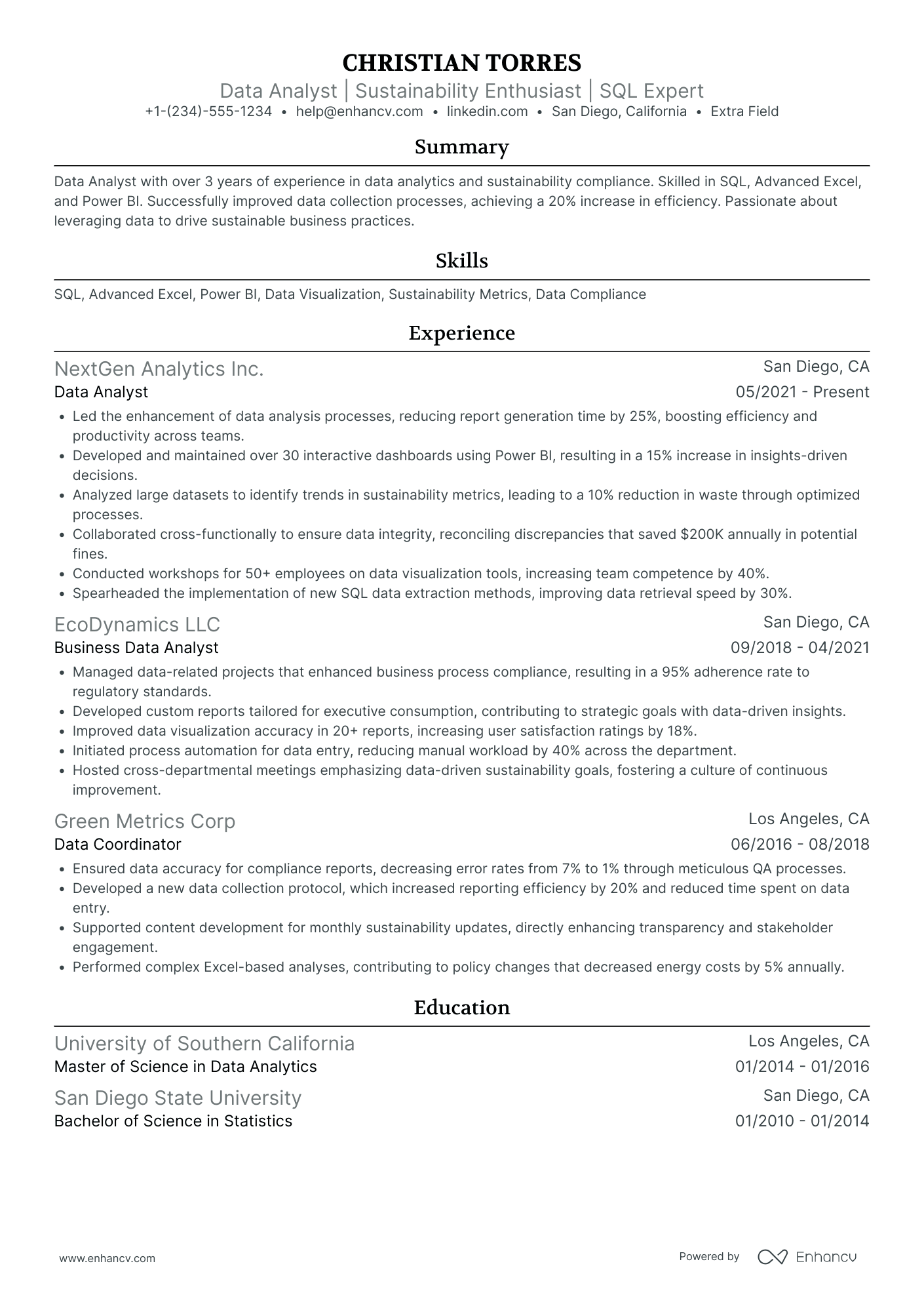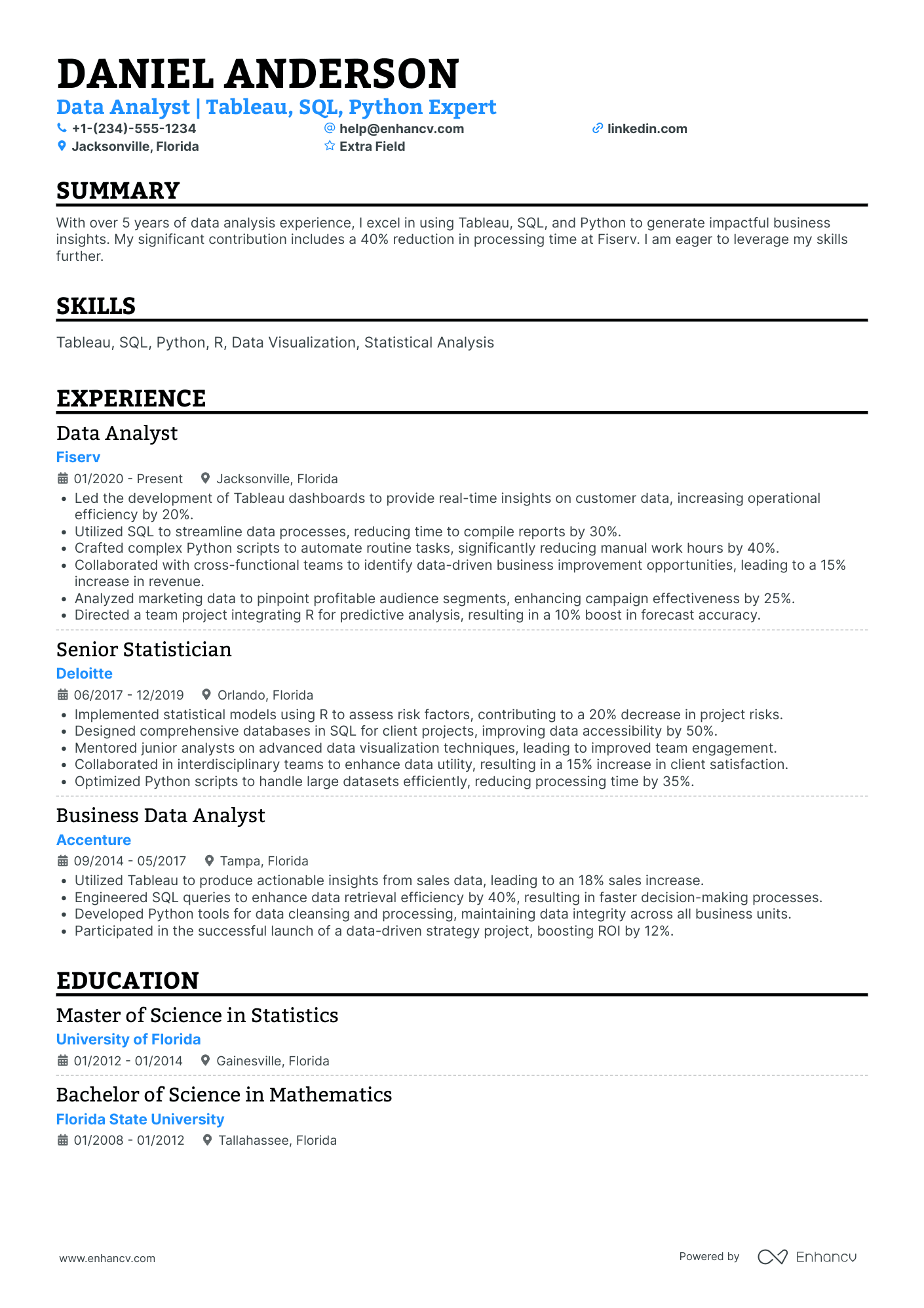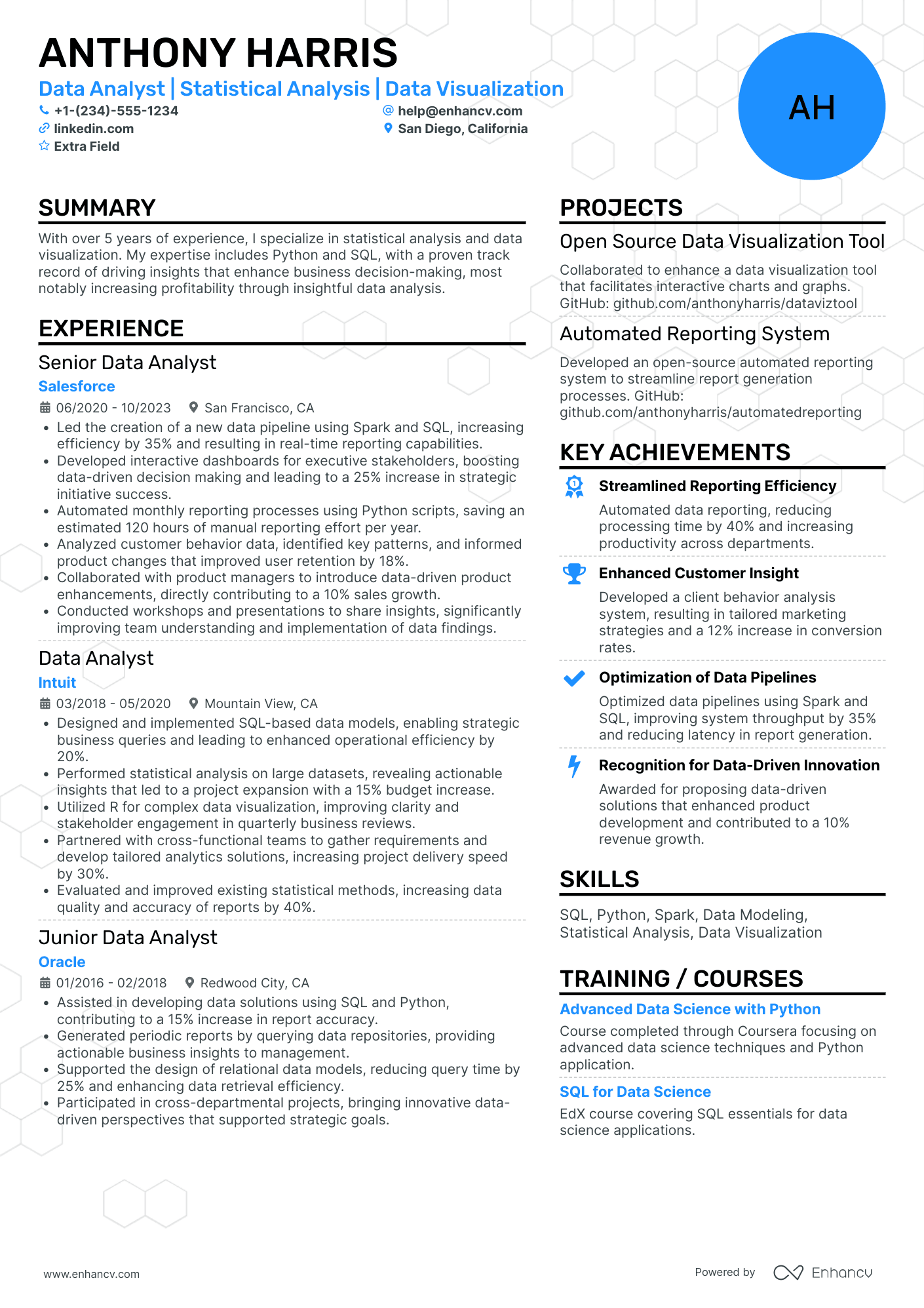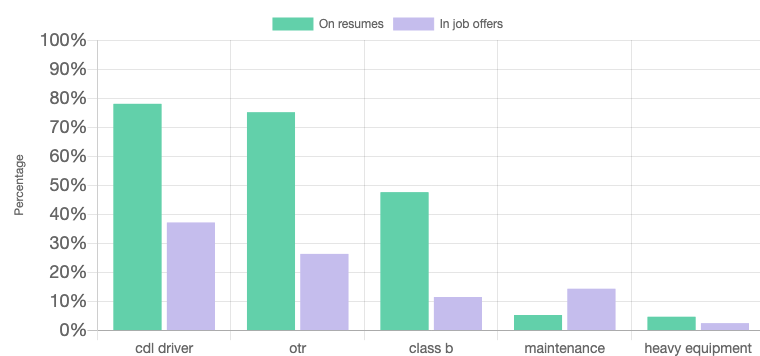Meet Jimmy. He’s the CTO of a Fortune 500 company you’ve been dreaming of working for for years.
Jimmy is on the hunt for a new data analyst to join his team. Your chance has finally come!
The problem is, everyone wants to work for this company. Your resume will be one of hundreds submitted.
How can you show Jimmy that you will bring real value to his team?
You need a resume that shows off your true potential and skill. One that will make you the one he wants to interview.
We’ve done the research into job-winning SQL data analyst resumes.
In this guide, we’re going to walk you through step-by-step how to write that winning resume.
This SQL data analyst resume guide will teach you:
- How to write the best headline, summary, education & skills section
- How to word your experiences and achievements so they show your incredible value
- Impressive SQL data analyst resume examples that will get you started in the right direction
- Insights and helpful tips from real-world hiring managers of data analysts
We’re here to help you stand out from the pack with our ultimate guide on how to write a SQL data analyst resume that will get you noticed and hired in no time.
Let’s get started.
What format should you use for your SQL data analyst resume?
Format
Let’s first talk about resume format. There are countless resume formats to choose from, but the most practical one for a SQL data analyst resume is the reverse chronological resume.
Why?
The reverse chronological resume describes your most recent job first and moves backwards in time for every subsequent position.
A SQL data analyst resume might have everything from statistics to SSAS knowledge listed on it.
You may have a wide set of experience, but your resume will look irrelevant to a recruiting manager if you stuff it all in.
In the short time a recruiter will spend looking at your resume, they need to see the most relevant information first.
Put your best foot forward and use a reverse chronological resume format to highlight your most recent accomplishments in your career.
Most importantly, customize your resume to the job you’re applying for. Include experience that covers the specific requirements of the job posting, and remove anything else that is not directly relevant.
Font
It may seem trivial, but the font you choose for your resume can have a big impact on whether or not your resume is even read. Using a professional and clear font that is suitable for resumes is a small step you can take for success.
File Type
Save your resume as a PDF. It gives you the security that your resume will still look the same regardless of what programs hiring managers are using to open it, and it works great to get past Applicant Tracking Systems.
Think about the location of your application – Canadian resumes, for instance, might follow a different structure.
The top 5 SQL data analyst resume sections
- Education & Qualifications
- Technical Skills
- Experience
- Projects
- Summary
The 5 most important points to include in the header
The header of your resume gives a snapshot into who you are - your name, your title and your location. It also gives the hiring manager helpful links they can follow to see your past projects and public profiles, like your LinkedIn account.
Here are the most important points you absolutely need to include to perfect your resume header in your SQL data analyst resume:
- Your full name
- Your title
- Your location (City + State/Province/Region/Country)
- Relevant links (LinkedIn profile, GitHub profile, personal website)
- Contact information
Let’s move on to two examples of resume headers - one is right and one is wrong. Can you spot the correct one?
SQL data analyst Resume Samples [Headers]
This example may look right to you at first glance - they included their name, title and location, but it’s missing one important element….
Links!
They’ve missed a huge opportunity to show off their public projects and profiles by forgetting to include links in the header. It might not seem like such a big deal, but if they’re going head to head against hundreds of other applicants, the lack of links could be the difference between getting an interview or not.
This headline ticks all of the boxes - name, title, location and links to their public profiles.
Now you’re ready to move onto step #2 of writing your SQL data analyst resume:
It’s time to craft the perfect summary.
How to write a summary for a SQL data analyst resume
The resume summary will be the first thing hiring managers read, so it’s essential that you clearly display what kind of impact you can make as a SQL data analyst.
The summary should not be about what you want, so hold off on the generic “seeking a full-time position” cliche.
Instead, answer to the top motive that companies have when they’re hiring for a new role: what kind of measurable improvement will you make to their company?
Here are the main points to include in your summary to show off your impact as a SQL data analyst:
- Use real numbers to prove your experience level (eg. 3 years of experience)
- Be specific about the industry you’re passionate about working in (eg. healthcare)
- Include where you have made improvements to a business in the past through your SQL data analysis (eg. increased revenue by 20%)
Let’s show you some real-world examples of a summary that needs more work vs. a summary that will wow a recruiter or hiring manager…
SQL data analyst Resume Samples [Summary]
This summary is way too vague and generic. It doesn’t speak about the accomplishments of the applicant in any way, and it doesn’t show passion for the company they’re applying for.
It doesn’t say what they can do for them.
Let’s take a look at a summary done well…
That summary is exciting to read!
It uses real figures to prove success in the past.
It mentions the industry of expertise (financial technology).
The summary is also personalized to the company they’re applying for, showing a real desire to work for them.
Want to test out these tips and write your own summary? Build your SQL data analyst resume using our drag-and-drop resume builder and get instant feedback on your resume.
How to make your SQL data analyst resume stand out in the experience section
Companies hire for impact - what can you do for their company if you were hired today?
The best way to prove your value is in the resume experience section.
By directly highlighting your past accomplishments in SQL data analysis, and highlighting the measurable results you achieved, you will build trust with the hiring manager or recruiter.
Let’s make your SQL data analyst resume stand out among the crowd with a valuable Experience section:
- Don’t just focus on responsibilities.
Most applicants simply list off their responsibilities in their past roles as a SQL data analyst.
While it may be true that you developed large databases, downloaded operational data, forecasted recommendations or processed data collection, that means nothing to the company hiring you unless you made a significant improvement to their bottom line.
- What was the impact of your work in the past?
Show off your communication skills and speak in business terms. This may be a technical resume, but it should be written in a way that a non-technical person can understand the measurable impact you can make for their business.
Consider questions such as:
- Did your work reduce customer churn?
- Did your analysis lead to a boost in revenue?
- Did you optimize company processes?
- Did you improve sales and marketing efforts?
- Did your reporting lead to new funding?
- Include an impact statement for each SQL data analyst position you’ve held before.
Summarize your impact using real numbers in one or two sentences for each position.
- Talk about the technologies and areas you are familiar with.
Your career as a SQL data analyst will include many areas of expertise. It’s essential that you clearly define in your resume the areas you are most familiar with.
Are you a dev-heavy data analyst who is capable of building middlewares and customizing RAPS files? Or are you more finely tuned with documenting issues and using queries to identify improvements?
Your experience will dictate if you are the right fit for the job. By highlighting the specific technologies and processes you are most familiar with, you will paint a clearer picture for the hiring manager about what you can do.
Some candidates focus on who they reported to, others focus on the accuracy and/or complexity of the models they built, while others just mention the types of projects they worked on. But rarely anyone covers the most important thing I’m looking for – what was the impact of their work? Why would I even consider paying them to come and work for me?
Ben Dias, Data Science Director at easyJet
Here are a few examples to get you started in the right direction.
- •Management of all reporting and analytics
- •Gather, organize and analyse information
- •Provide support for company operations
The points mentioned are too vague and they do not demonstrate real evidence of success in the role.
- •Created data visualizations in Tableau that contributed to a $3 million increase in funding.
- •Established departmental procedures and workflow that increased productivity by 15%.
- •Managed a team of 5 data analysts in the development of 3 database projects for clients.
This one is much better. The bulleted points include real numbers and figures, and they focus on the direct value the applicant brought to their company.
Pro tip
Show off real numbers that display your accomplishments in past roles. Instead of listing out your responsibilities as a SQL data analyst, talk about the measurable impact you made to their business. Did you boost their revenue? Increase customer retention? Mention your proudest points on your resume.
Here’s what the hiring managers of SQL data analysts are looking for in the education section
It’s been mentioned over and over by hiring managers… SQL data analysts should have a good foundation of mathematics to be hired. That’s why the Education section of your resume is super important to showcase your knowledge.
While there are lots of different programs you’ll use as an analyst, at the end of the day, you need to understand the logic behind them. That’s why you’re being paid. Anyone can use a system, but you’re really bringing the expertise of how it works behind the scenes. So, have a solid foundation in regression analysis and predictive tools.
Jennifer Good, Career Coach & Big Data Analytics Expert at The Career Force
The top university and college degrees for SQL data analysts are:
- Mathematics
- Statistics
- Computer Science
- Information Technology
- Engineering
- Data Analytics
All hope isn’t lost if you don’t have a university or college degree.
While hiring managers and recruiters do value formal education in their hunt for a SQL data analyst, a lack of education can be supplemented with a decent amount of experience, a proven track record in past programming projects and/or informal education, like certifications.
We mention our list of the top five SQL certifications later on.
Want to try your hand at crafting the perfect Education section? Get started building your own SQL data analyst resume using our drag-and-drop builder and get instant feedback on your resume.
The top skills you should highlight on your resume as a SQL data analyst
Tailor your resume for the job that you want.
Every time you submit your resume for an open position as a data analyst, you should be updating the resume to reflect the skills they are seeking.
Read the job description closely, and update the Skills section of your resume so that it closely matches the ones listed in the job description (but only include a skill if you genuinely know it).
38 SQL data analyst skills you may want to add
Here’s a list of technical and soft skills that you might want to add to your resume skill section.
28 Technical skills to include on a SQL data analyst resume
- Math
- Statistics
- SQL
- Ruby
- Shell
- Python
- R
- SSIS
- SSRS
- Data Modeling
- Data Warehousing
- ETL
- MapReduce
- Hadoop
- Pig
- Open Refine
- Tableau
- Apache Spark
- SSAS
- HTML
- Javascript
- .Net framework
- C#
- C++
- Linux
- Web scraping
- Microsoft Excel
- Statistical methods (regression analysis, psychometrics, factor analysis, etc.)
11 soft skills to include on a SQL data analyst resume
- Problem solving
- Communication & people skills
- Project management
- Experience with collaboration tools like Slack, JIRA, Trello, Asana, etc.
- Self-motivated
- Data visualization
- Presentation skills
- Leadership & management
- Fast learner
- Client relations
- Documentation skills
Even in a technical resume, recruiters and hiring managers highly value soft skills, such as excellent communication.
You may be a proficient technical superstar, but you need to know how to translate your findings to the business world.
Businesses want to hire people who can work well with everyone. You should make it clear that you can explain your technical findings in a clear, understandable way for your team members.
How do you talk with people? How well are you able to write and articulate what you need to say? This is super important. You need to be able to be clear with people. You can be the most fantastic technical programmer, and if you can’t communicate it, it’s really going to hurt your career.
Jennifer Good, Career Coach & Big Data Analytics Expert at The Career Force
Speaking of presenting your findings in a clear way, data visualization is a skill that used to be considered an added bonus, but is now considered a requirement as a SQL data analyst.
You should know how to create static or dynamic reports in a way that is helpful to other people. Don’t fret if you don’t know how - you can find some excellent resources online to learn how to create data visualizations in Excel, Tableau or any other tool.
How to include your certifications on your resume (+5 of the top SQL certifications available online)
Including certifications on your resume will help you:
- Stand out from the competition
- Show your passion for data analytics
- Prove your commitment to your professional development and continuous learning
- Make up for any lack of formal education you don’t have (university degree)
We scoured the web to find the top 5 SQL certifications you can take to boost your SQL data analyst resume.
The top 5 SQL certifications to include on your resume
- The Complete SQL Bootcamp - Udemy
- Learn SQL - Code Academy
- SQL & Database Design A-Z: Learn MS SQL Server + PostgreSQL
- Oracle SQL: Become a Certified SQL Developer From Scratch!
- SQL Server Training and Certification - Microsoft
We used big data to get you critical insights
With all the competition in data analysis, knowing what the competition is up to will get you far. That’s why we analyzed thousands of SQL data analyst resumes and job offers to understand which skills are most in demand and which are showing up most often on resumes:
Key points to remember to create the best SQL data analyst resume
- Focus on how you can bring direct impact to the business
- Highlight your communication skills just as much as your technical skills
- Prove you have a strong foundation in mathematics
- Link to any public projects you have available - even if they are related to another programming language
- List tools you are already familiar with (Excel, Hadoop, Open Refine, Tableau, Apache Spark, SSAS, etc.)
- Proofread your resume multiple times so you don’t miss out on any typos or spelling mistakes
SQL Data Analyst resume examples
By Experience
Junior SQL Data Analyst
Senior SQL Data Analyst
Lead SQL Data Analyst
By Role
